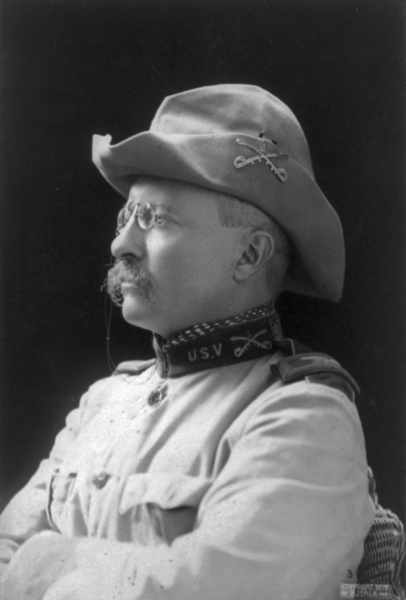In terms of the Spanish American War, to Theodore Roosevelt war with Spain was inevitable, when the battleship Maine mysteriously exploded in Cuba’s Havana harbor in February 1898. Having been appointed to the post of Assistant Secretary of the Navy in 1897 by President William McKinley, Teddy had the chance to put his wartime military aspirations to good use when the Secretary of the Navy – John D. Long – stepped away from the office for several hours.
The battleship Maine, which was sent to protect the interests of the U.S. while Cuba revolted against Spain, suddenly exploded and sank, killing 3/4 of the crew on February 15, 1898. Although the cause of – and responsibility for – the explosion were undetermined, thanks to yellow-press articles printed by William Randolph Hearst and Joseph Pulitzer, Americans demanded action. In fact, the demand for action came with its own catchphrase: “Remember the Maine, to hell with Spain!”
Because of Long’s absence, Roosevelt was the Acting Secretary of the Navy long enough to order the Navy to prepare for war, including ordering supplies, ammunition, experts, and the recruitment of an inexhaustible supply of sailors. On April 20, 1898, President McKinley signed a joint resolution ordering Spain to withdraw from Cuba. The following day, Spain cut all diplomatic ties with the U.S. and the U.S. Navy started blockading Cuba. On April 23, Spain declared war, and on April 25 Congress declared war had actually started April 21. Ironically, the same day Congress formally declared war, Roosevelt officially resigned from his position as Assistant Secretary of the Navy and founded the First U.S. Volunteer Cavalry Regiment (called the “Rough Riders”).
Teddy founded the “Rough Riders”, along with Colonel Leonard Wood (U.S. Army), consisting of volunteers from a wide range of men, including cowboys from the west and Ivy League friends from New York. This regiment consisted of men from a variety of backgrounds, such as gentlemen from Boston and New York, hunters, sheriffs, full-and mixed-blooded Indians, and athletes in football and baseball.
After obtaining several carbine weapons in Washington, Theodore arrived to join his men for training in San Antonio, Texas. While there, they received equipment from the Quartermaster Depot of Fort Sam Houston (including horses). Their outfits were made of brown canvas, and their weapons were machetes (instead of sabers), dynamite guns, and Colt Machine guns (gifts from the East Coast Rough Riders).
Following rigorous training, the regiment received orders on May 28 to Cuba. They boarded trains in San Antonio, what would be the beginning of a long and punishing ride to Tampa, Florida. Following a week-long delay in the Tampa Bay (due to rumors of the Spanish Navy), they finally left on June 13, landing in Daiquiri on June 23, 1898.
After General Young’s illness with fever, Roosevelt was promoted to Colonel, allowing him to lead the regiment. During his leadership, he fought alongside his troopers at the Battle of San Juan Hill on July 1, 1898. Because of his heroic actions, he was nominated (but disapproved) for the Medal of Honor. Finally, in 2001 he was awarded the Medal of Honor (posthumously) for his military valor, making him the only U.S. president to do so. Due to receiving the Nobel Peace Prize in 1906, he is also the only person in the country’s history to receive both the highest military and peace awards. Because of the Spanish American War Theodore Roosevelt accomplished one of the most unique honors of any president.
Related Posts
Was Theodore Roosevelt A Progressive?
Was Theodore Roosevelt A President?
Trust Buster Theodore Roosevelt
Theodore Roosevelt Vs Woodrow Wilson
Theodore Roosevelt’s Personality
Theodore Roosevelt’s Political Party
Theodore Roosevelt And The Rough Riders
Theodore Roosevelt And The Panama Canal
Theodore Roosevelt And The Environment
Theodore Roosevelt And Imperialism
Theodore Roosevelt And His Family
Theodore Roosevelt And Conservation
When Was Theodore Roosevelt Born?
Information About Theodore Roosevelt
Were Franklin And Theodore Roosevelt Related?
Facts About Theodore Roosevelt
